David Clarke was a Pageant Master. Not only did he organise pageants, but he also studied and documented the history of these truly remarkable events. As such, his collection, recently acquired by King’s, takes a journey through pageant history within the UK, and exposes not just the highs, but also the lows, of a Pageant Master’s career.
David Clarke, Pageant Master – photograph from David Clarke’s collection
As one of the newest members of the archives team here at King’s, I was so happy to take on the task of listing and repackaging this collection. What an interesting way to start a new job! As a northerner whose previous job was in Yorkshire, I was delighted to discover some familiar locations in David’s pageant programme collection:
The Official Programme of the York Pageant (1909) – from David Clarke’s collection
I also found programmes for pageants in Salford, Bradford and Chester. There were colourful pageant publications for cities, towns and villages across the UK, from Newcastle, Birmingham and London to Old Chiddingford and Shamley Green. These pageant programmes, souvenirs and books of words are works of art in their own right. Carefully illustrated and designed, they often documented the pageant script in detail, and sometimes included photographs, musical scores, and long lists naming everyone who contributed. I particularly liked the cover design for Chelsea Pageant’s ‘Book of Words’.
Chelsea Historical Pageant: Book of Words (1908) – from David Clarke’s collection
Before working with this collection, I only had a very basic idea of what a pageant is/was, but I had no idea of the scale at which such events once took place. Many took months, even years of planning, scripting, designing and organising. Whole communities would be involved as participants and audiences, as can be seen below, in a scene from Warwick Pageant (1906).
Performers at Warwick Pageant in 1906, pictured in the book ‘Pageants’ by Anthony Parker – from David Clarke’s collection
Costumes and props were often elaborate, and people bought tickets to see the performances.
‘The Phoenicians – Episode 2’ from Mary Kelly’s book ‘How To Make A Pageant (1936) – from David Clarke’s collection
I was really impressed with the costumes – even the horses wore fancy attire.
Above and below: Undated photograph from David Clarke’s pageants – from David Clarke’s collection
You can tell that a lot of work and imagination had been invested in these costumes.
Undated photographs from one of David Clarke’s pageants (above and below) – from David Clarke’s collection
Clarke’s collection dates back to events that took place before he was even born. In 1905, Louis Napoleon Parker organised a spectacular pageant at Sherborne. Following this, villages, towns and cities across the UK seemed to go pageant-mad. Clarke’s collection represents an impressive array of these, via programmes, words, musical scores, photographs and research.
Louis. N. Parker in an undated photograph from David Clarke’s folder of pageant research. Pictured with one of the main tools of the trade – a huge megaphone.
The lives and careers of other pageant masters are also documented in Clarke’s collection, including Louis Parker’s son Anthony, actor-turned-pageant master Frank Lascelles, and even a couple of female pageant masters, Mary Kelly and Gwendoline Lally.
Gwen Lally in an undated press cutting from David Clarke’s collection
I absolutely love this image. It’s inspiring to see a woman take on this key role in the pageanting world.
Certainly, there’s plenty here for pageant history enthusiasts and anyone interested in the history of performance and public participation more broadly. However, for me, the most thought provoking and moving part of the collection documents Clarke’s own career.
When Kings Rode to Corfe Programme (1991) – from David Clarke’s collection
His personal papers document the highs and the lows of this unusual line of work. There are programmes signed for him by participants, albums of photographs and letters of thanks (and general support) from people who were enthused by this world of costume, drama and public display.
A Pageant of England: Programme (pages signed by participants) – from David Clarke’s collection
However, the collection also reveals the challenges David faced in keeping the spirit of the pageant alive. Correspondence reveals uncertainty about the terminology (it appears that the word ‘pageant’ had become off-putting to some) and struggles to get participants and supporters on board. Indeed, Clark’s collection documents all the preparation invested in cancelled events as well as those that went ahead.
Undated photograph of a scene from one of David Clarke’s pageants – from David Clarke’s collection
Although the terminology has gone out of fashion, the concept of a pageant never truly disappeared. How about the 2012 Olympic opening ceremony? Wasn’t that just a gigantic pageant? Or what about the work of contemporary artist Jeremy Deller? Local history re-enactors? Cosplay?
Here at King’s the History Department is doing an amazing job of ensuring that pageant history lives on – check out their work here. I’d also like to thank all of those who made it possible to acquire this collection including David Clarke’s family and Professor Paul Readman, who is also in charge of the pageants database linked to above.
In the meantime, I look forward to cataloguing David Clarke’s collection in more detail, and to sharing it with visitors. Please contact us to find out more, and to come and see it!
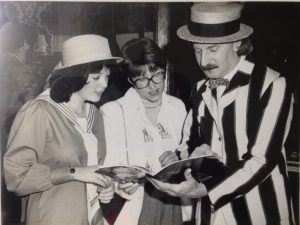
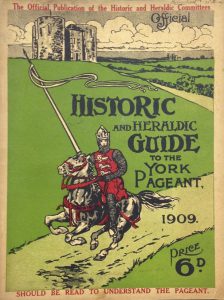
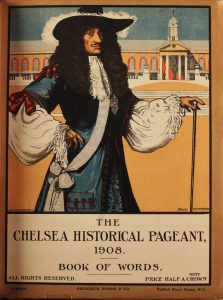
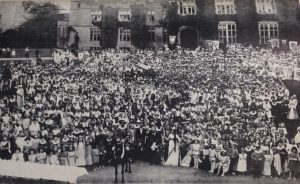
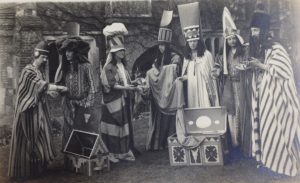
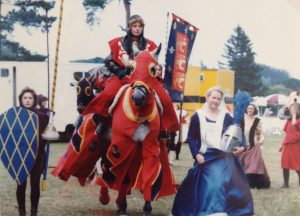
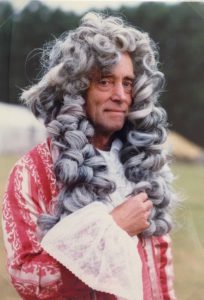
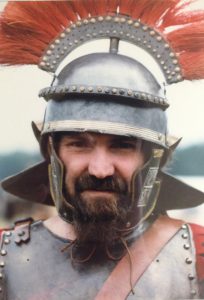
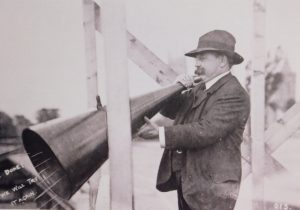
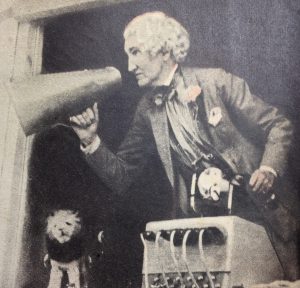
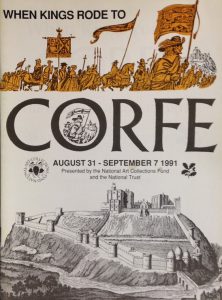
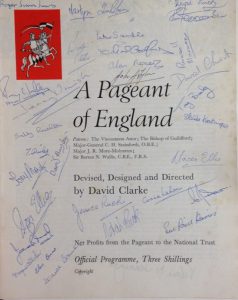
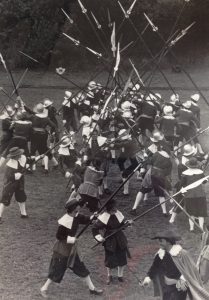
trying to find photos of the corfe castle pageant
Hi Peter, The Archives Reading Room is currently closed due to COVID-19 restrictions but please keep checking our website for updates: https://www.kcl.ac.uk/library/coronavirus-update Perhaps you would like to come to see the collection when we’re welcoming Readers again?
Thanks for your interest!